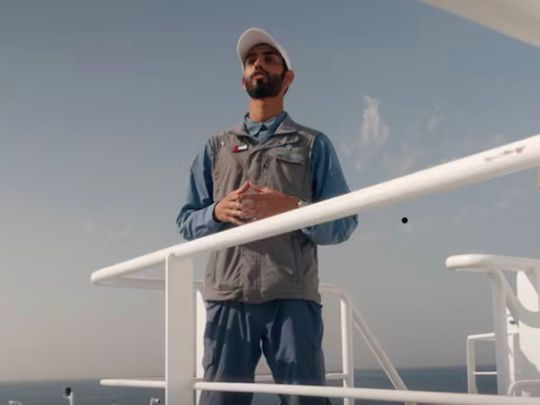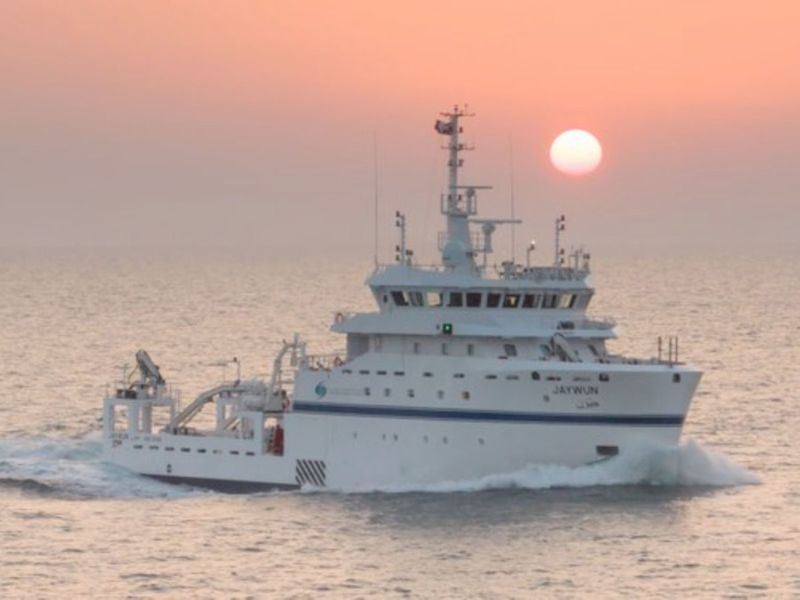
Abu Dhabi: Jaywun, the most advanced research vessel in the Middle East, is equipped with six laboratories and a remotely-operated submarine vehicle, that is supporting science in the study of oceans, the sustainability of marine environments, and the preservation of healthy aquatic ecosystems.
Sultan Al Hammadi, a researcher aboard the Jaywun research vessel, has outlined the ship’s key missions, and explained its capabilities in advancing research and discovery for the benefit of scientific communities both regionally and around the world.
The vessel, capable of studying marine environments and fisheries in waters deeper than 10 metres, will greatly contribute to understanding the impacts of climate change, in order to develop appropriate solutions to address this pressing challenge.
One of the vessel’s key missions include the comprehensive evaluation and assessment of marine biodiversity using a set of scientific labs, including the fish, chemical and physical lab, the marine water sample-collection lab.
“By using this vessel, we aim to create a highly-regarded scientific platform that meets the needs of marine research studies in the region,” said Al Hammadi.
Climate change stories in pictures
Named after one of the most valuable pearls found in the Arabian Gulf, Jaywun is a 50-metre craft that will operate in the UAE’s territorial waters and allow Environment Agency - Abu Dhabi (EAD) to study marine environments and fisheries in waters deeper than 10 metres.
Submarine vehicle, 6 labs
The vessel will berth approximately 30 people and features a remotely-operated submarine vehicle as well as six fully equipped laboratories to study marine samples.

The new vessel will support efforts to maintain the biodiversity and resource of the UAE by conducting comprehensive surveys across fisheries, coral reef, seagrass habitat and deep-water marine environment surveys.
Additionally, the vessel will play an important role in developing strategies and management plans to ensure the recovery and sustainability of fish stocks.
Jaywun will support several EAD environmental initiatives, including the Blue Carbon Assessment Project for Oceanic Fisheries – the first oceanic, blue carbon fisheries assessment survey in the region.
The survey project was created to support the UAE’s strategic initiative to achieve climate neutrality by 2050 and will be conducted in the country’s waters.
A baseline survey of the marine environment will be also conducted to identify important biodiversity sites and set priorities for the conservation of the marine environment and biodiversity.
As well as conducting surveys to map and monitor marine habitats, including seagrass and coral reefs, EAD will monitor the emirate’s deep-water habitats and survey marine wildlife to record species and the general distribution of marine mammals and threatened species in the emirate’s deeper waters.
In addition, marine water quality surveys using CTDs, plankton nets and sediment samplers to analyse water quality at different depths will also be undertaken.
A Fisheries Resources Assessment Survey will be also conducted to obtain updated stock size estimates, providing comparisons with abundance estimates from previous surveys. As well as undertaking biological studies, the work plan also includes establishing a DNA baseline for the UAE’s main fish species, while studying the complete genome sequences of more than 12 major fish species. The survey combines the collection of marine organisms with the use of underwater sound wave techniques.
The agency has collaborated with G42 and OceanX to equip the research vessel with the latest technology to study the DNA of marine organisms and fish during surveys that EAD will conduct. An integrated database will be prepared for those species and linked to their genetic sequence – a first in the use of this technology.








